第20章 THE DEFEAT OF THE CITY(2)
They drove homeward. The low sun dropped a spendthrift flood of gold upon the fortunate fields of wheat. The cities were far away. The road lay curl- ing around wood and dale and bill like a ribbon lost from the robe of careless summer. The wind followed like a whinnying colt in the track of Phoebus's steeds.
By and by the farmhouse peeped gray out of its faithful grove; they saw the long lane with its convoy of walnut trees running from the road to the house; they smelled the wild rose and the breath of cool, damp willows in the creek's bed. And then in unison all the voices of the soil began a chant addressed to the soul of Robert Walmsley. Out of the tilted aisles of the dim wood they came hollowly; they chirped and buzzed from the parched grass; they trilled from the ripples of the creek ford; they floated up in clear Pan's pipe notes from the dimming meadows; the whippoorwills joined in as they pursued midges in the upper air; slow-going cow-bells struck out a homely accompaniment -- and this was what each one said:
"You've found your way back at last, have you?"
The old voices of the soil spoke to him. Leaf and bud and blossom conversed with him in the old vocabu- lary of his careless youth - the inanimate things, the familiar stones and rails, the gates and furrows and roofs and turns of the road had an eloquence, too, and a power in the transformation. The country had smiled and he had felt the breath of it, and his heart was drawn as if in a moment back to his old love.
The city was far away.
This rural atavism, then, seized Robert Walmsley and possessed him. A queer thing he noticed in con- nection with it was that Alicia, sitting at his side, suddenly seemed to him a stranger. She did not be- long to this recurrent phase. Never before had she seemed so remote, so colorless and high - so intan- gible and unreal. And yet he had never admired her more than when she sat there by him in the rickety spring wagon, chiming no more with his mood and with her environment than the Matterhorn chimes with a peasant's cabbage garden.
That night when the greetings and the supper were over, the entire family, including Buff, the yellow dog, bestrewed itself upon the front porch. Alicia, not haughty but silent, sat in the shadow dressed in an exquisite pale-gray tea gown. Robert's mother dis- coursed to her happily concerning marmalade and lumbago. Tom sat on the top step; Sisters Millie and Pam on the lowest step to catch the lightning bugs. Mother had the willow rocker. Father sat in the big armchair with one of its arms gone. Buff sprawled in the middle of the porch in everybody's way. The twilight pixies and pucks stole forth un- seen and plunged other poignant shafts of memory into the heart of Robert. A rural madness entered his soul. The city was far away.
Father sat without his pipe, writhing in his heavy boots, a sacrifice to rigid courtesy. Robert shouted:
"No, you don't!" He fetched the pipe and lit it; be seized the old gentleman's boots and tore them off.
The last one slipped suddenly, and Mr. Robert Walmsley, of Washington Square, tumbled off the porch backward with Buff on top of him, bowling fearfully. Tom laughed sarcastically.
Robert tore off his coat and vest and hurled them into a lilac bush.
"Come out here, you landlubber," be cried to Tom, and I'll put grass seed on your back. I think you Called me a 'dude' a while ago. Come along and cut your capers."